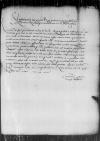Letter #2587
Sigismund I Jagiellon to Ioannes DANTISCUSCracow (Kraków), 1542-09-20
| received Heilsberg (Lidzbark), 1542-09-30 Manuscript sources:
| ||||
Text & apparatus & commentary Plain text Text & commentary Text & apparatus Excerpts concerning Dantiscus' travels
Reverendo in Christo Patri, domino
Reverende in Christo Pater, sincere nobis dilecte.
Quod petit a nobis Paternitas Vestra, ut liberum per nos ei sit
Quamobrem quas causas Paternitas Vestra habeat, cur ad
Bene valeat.
Dat(ae) or Dat(um)⌈Dat(ae)Dat(ae) or Dat(um)⌉
Commissio propria regiae maiestatis


 BCz, 1601, p. 368
BCz, 1601, p. 368